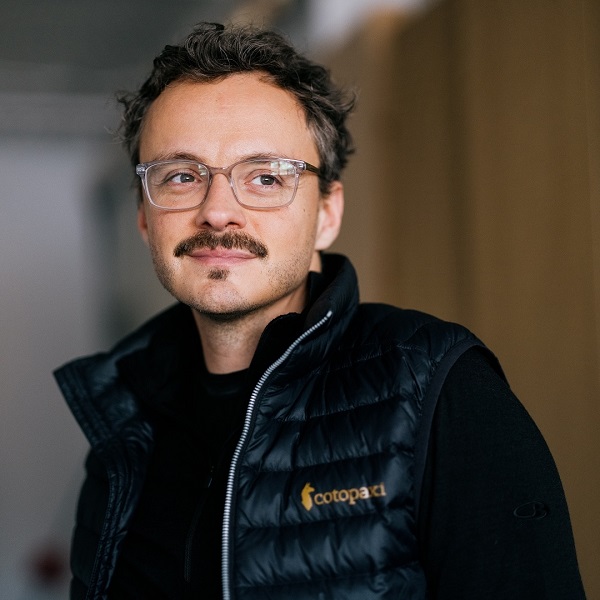Robots that paint precise brushstrokes, powered by AI-enabled software that transforms an idea or image into a compelling work of art – this is how Chloë Ryan, BEng’24, plans to turn the fine art industry on its head. Her goal? To make art more accessible so visual artists can reproduce their artwork at scale to earn a good living – the same way musicians, writers and filmmakers do.
“I’ve always loved art, and started selling my paintings when I was about 14. I was frustrated that I’d have multiple people interested in a given piece for, say, $500, but when I did the math, I was making only a few dollars an hour,” recalls Ryan. “I didn’t see how it would be possible to make a living as an artist. That was a big part of my pivot to study engineering at McGill and not pursue art.”
Ryan’s entrepreneurial spirit took root at an early age. When she was nine, she made and sold pom-pom toys during recess. At 10, a backpacking trip across Southeast Asia with her family inspired her to fundraise for a non-profit that assists the poor in Cambodia.
“I started a jewelry company, sold sock monkeys and helped raise over $14,000 to build eight houses in Cambodia,” she says.
“Right now, the art industry understands things in terms of original or replica. I’d love to see a creative industry where pieces are valued because they’re good, not because they’re rare.”
Chloë Ryan, founder and CEO of Acrylic
Fast-forward to Ryan’s second year at McGill, when she wondered if using mechanical industrial automation could help her create art faster. At first, she focused on building a robot that could learn how to paint, but Ryan soon realized that by pushing the boundaries of machine learning, she could help working artists create new income streams.
“Other creative industries have technologies that allow you to capture the art form very close to its original format and distribute it to the masses,” she explains. “It’s not just the top one per cent of society who can listen to music, so it’s silly that so few people can interact with the art industry because it’s so scarcity focused and cost prohibitive.”
In 2021, Ryan turned her vision into a business, Acrylic Robotics. By capturing millions of brush stroke data points and fitting a robotic arm with a paint brush attachment, Acrylic’s technology mimics an artist’s movements, creating artwork with depth and dimension. Each painting is unique because of how the paint pigments mix and the brush dips, explains Ryan.
Several McGill programs that support young entrepreneurs helped Ryan launch her dream. In 2020, she received $6,500 from McGill Engine’s TechAccel Program, an initiative that provides mentoring and funding for early-stage student ventures. A year later, she picked up additional funding to hire an intern from McGill Engine’s Summer Startup Internship program.
After earning the Faculty of Engineering’s Ian Mclachlin Prize for Entrepreneurship in Engineering, Ryan moved on to Centech – a non-profit business incubator program that focuses on tech companies with high growth potential – where she won the Top Tech Innovation Prize.
McGill continued to play a role as she developed Acrylic. “We went to New York and Los Angeles through McGill’s Dobson X-1 summer program, which has an international pre-seed funding tour where startups attend conferences and pitch events to secure investment,” she says. “I’m so grateful for McGill’s support.”
Ryan also credits her research supervisor, assistant professor of electrical and computer engineering AJung Moon, for providing invaluable support on the technical side.
Ryan has received accolades for her work on Acrylic. She won the Satchu Prize for excelling in Next Canada’s Next 36 program (a national initiative that helps to develop promising young entrepreneurs) and was named one of C2 Montreal’s Emerging Entrepreneurs for 2022.
Yet Ryan still faced a common startup hurdle: securing funding.
“[Venture capital] is all about pattern matching; I was a 19-year-old solo female founder building a robotics company and there were basically zero data points of successful founders who fit that pattern, so it took me far longer to build the company,” she says.
Last year, the producers of CBC Television’s Dragon’s Den invited Ryan to pitch to their panel of high-profile investors in Toronto. She and her colleague Kyle Suri succeeded in piquing the interest of several of the dragons – but they turned down the offers they received, unwilling to sell significant stakes in their young company for investments they deemed as too low.
“For a lot of startups – especially before they’ve learned how venture capital works – it’s often, ‘That’s a lot of money; I should take it’. But I have no regrets,” says Ryan. “If you believe in your idea, and it’s a good one, the money will come. It’s a matter of finding the right strategic partners and the right terms.”
Ryan has delivered keynotes worldwide about AI and robot ethics, the intersection of art and technology, and how to support female and minority entrepreneurs. She’s pitched Acrylic internationally, leading to mostly U.S. investor interest.
While Ryan’s aim is to partner with artists, not replace them, she admits some didn’t understand her vision at first. As image generation tools like DALL·E and Midjourney became available, artists worried about being ripped off, she says.
“There’s truth about robotic systems and AI systems taking jobs and changing industries, but for me, it was about building a business model that keeps artists in the loop and allows them to multiply their efforts as opposed to substituting,” she says.
“You have to opt in for us to use your style data and you create the piece yourself. Then, you’re the one selling it, or we help you sell it, but it’s supporting your livelihood,” she says.
Acrylic has teamed up with a dozen Canadian artists on pilot projects and has more than 250 international artists on their wait list. Ryan hopes to plug Acryclic into the existing art network of distributors, producers, sales platforms and artists.
“Right now, the art industry understands things in terms of original or replica. I’d love to see a creative industry where pieces are valued because they’re good, not because they’re rare,” explains Ryan. “I’m very excited to see that shift.”


